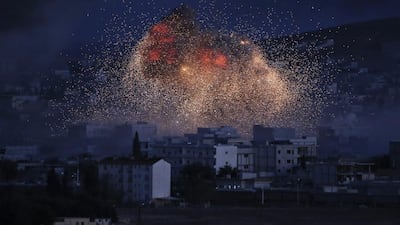KUWAIT CITY // The Gulf Cooperation Council has experienced a roller-coaster year so far, with an internal dispute spilling into public, airstrikes on the extremist Islamist group ISIL, and calls for reforms on state spending.
Such events are hardly common practice among the six-member GCC, currently headed by Kuwait.
For the moment, the group appears to have emerged stronger, with the unfamiliar actions symptomatic of a shift towards more assertive policies.
“It’s been a hard year with many challenges. However, the brotherly ties between the people and leadership of the GCC has helped us overcome these difficulties and challenges,” said the Kuwaiti minister of state for cabinet affairs, Sheikh Mohammed Al Abdullah Al Sabah.
The GCC, comprising the UAE, Kuwait, Saudi Arabia, Bahrain, Oman and Qatar, was established in 1981 to promote political, military, social and economic cohesion among its members. While the group at times appears arcane and even puzzling to outsiders, officials say their main aim is to establish unified positions on the various challenges facing their countries.
This is easier said than done. In March, the UAE, Saudi Arabia, and Bahrain withdrew their ambassadors from Qatar after Doha refused to end its support for the Muslim Brotherhood.
The unprecedented split reached a level of contention and public animosity not seen before among the GCC states.
Amid rumours of a border closure and possible sanctions, Kuwait’s emir, along with GCC officials, led successive rounds of diplomatic talks aimed at easing tensions.
“He was telling them to ‘cool it’,” Kuwaiti political analyst Shamlan Al Essa said of efforts made by Kuwait’s emir Sheikh Sabah Al Ahmad Al Jaber Al Sabah.
Qatar expelled several members of the Muslim Brotherhood in September, though Yusuf Al Qaradawi, a spiritual leader to the group, remains in the country.
Mr Al Essa added that it was not just the Muslim Brotherhood and their promotion of political Islam that caused tensions among GCC states.
Oman, Qatar and Kuwait are closer to Iran than the other GCC states, he said, an issue that at times caused friction.
These divergent world views were at least temporarily set aside this summer when GCC states decided to join the international coalition against ISIL.
The UAE, Qatar, Saudi Arabia and Bahrain are involved in air operations against ISIL targets in northern Syria.
Kuwait, which does not have the same military power as the other countries, provides logistical support to the coalition efforts. Canadian and Danish fighter jets are using Kuwaiti airbases to take part in the campaign against ISIL in Iraq.
Oman has also said it will work towards defeating ISIL.
While the decision to join the coalition against ISIL was made under the auspices of the Arab League, it came at a time when some GCC states, including the UAE, were displaying new and more assertive foreign policies.
That shift was aimed, at least in part, at countering political Islam, the most contentious issue for the group. These changes will likely have a lasting effect on the Middle East in the future, and also on the cohesion of the GCC.
Observers are waiting for the GCC's annual meeting, to be held in Doha this December, to see how tensions over the Muslim Brotherhood have cooled. While Kuwaiti officials said they were optimistic about their mediation efforts, others are more pessimistic about the level of rapprochement.
“The problems are deepening because Qatar’s neighbours feel that it is only paying lip service to their concerns,” said Bilal Saab of the Washington-based Atlantic Council, who recently met with senior GCC officials during a trip to the region.
“But more broadly, Doha has an issue of strategic depth and by partnering with a large political mass such as the Muslim Brotherhood it aims to address that deficiency. This foreign policy decision is not about to radically change, and Qatar’s leaders have been vocal and confident about their choice.”
Despite the differences, the GCC aims to strengthen its joint military capabilities next year, said former Kuwaiti diplomat Abdullah Al Murad.
While members have long aimed to unify their militaries, “now it’s become a real necessity”, said Mr Al Murad, a former ambassador to a number of countries including Turkey and Venezuela and also the United Nations.
He highlighted the threats posed by Yemen, Iran, Syria and Iraq.
“It’s time to focus on military issues,” he said.
Against this political backdrop are the changes to the oil market that for so long supported GCC economies.
Kuwaiti finance minister Anas Al Saleh called for “economic reforms” at a GCC finance ministers meeting on Saturday.
"This must be undertaken through strengthening of efforts to diversify away from oil and decrease dependence on oil revenue, which is now inevitable," he said, according to Reuters.
While at times there appear to be more challenges than victories, the GCC is expected to receive a boost with its long-awaited customs union, scheduled to be fully implemented in January.
“This is a very important development for GCC cohesion economically,” said Theodore Karasik, a senior adviser at Risk Insurance Management in Dubai.
“A customs union would help to solidify the connections between the member states, pushing the political agenda into the background.”
jvela@thenational.ae
* with additional reporting by Taimur Khan

